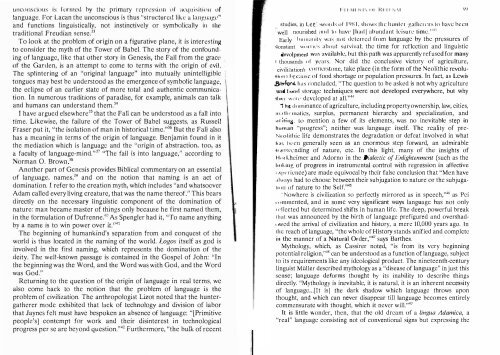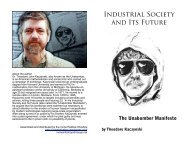CONTENTS - ouroboros ponderosa
CONTENTS - ouroboros ponderosa
CONTENTS - ouroboros ponderosa
Create successful ePaper yourself
Turn your PDF publications into a flip-book with our unique Google optimized e-Paper software.
UllcUllscious is formco by lhc primary rpression of acquisitioll l,r<br />
language. For Lacan the unconscious i thus "structurell likc a lallgu;lg,,"<br />
and functions linguistically, not instinctively or symholically ill tl1l'<br />
traditional Freudian sense.JJ<br />
To look at the problem of origin on a figurative plane, it is interestillit<br />
to consider the myth of the Tower of Babel. The story of the confound<br />
ing of language, like that other story in Genesis, the Fall from the gracl'<br />
of the Garllen, is an attempt to come to terms with the origin of evil.<br />
The splintering of an "original language" into mutually unintelligibk :<br />
tongues may best be understood as the emergence of symbolic language,<br />
the eclipse of an earlier state of more total and authentic communica<br />
tion. In numerous traditions of paradise, for example, animals can talk<br />
and humans can understand them."<br />
I have argued elsewhere" that the Fall can be understood as a fall into<br />
time. Likewise, the failure of the Tower of Babel suggests, as Russell<br />
Fraser put it, "the isolation of man in historical time."'· But the Fall also<br />
has a meaning in terms of the origin of language. Benjamin found in it<br />
the mediation which is language and the "origin of abstraction, too, as<br />
a faculty of language-mind."" "The fall is into language," according to<br />
Norman O. Brown .'s<br />
Another part of Genesis provides Biblical commentary on an essential<br />
of language, names," and on the notion that naming is an act of<br />
domination. 1 refer to the creation myth, which includes "and whatsoever<br />
Adam called every living creature, that was the name thereof." This bears<br />
directly on the necessary linguistic component of the domination of<br />
nature: man became master of things only because he first named them,<br />
in the formulation of Dufrenne. '[) As Spengler had it, "To name anything<br />
by a name is to win power over il.,,'1<br />
The beginning of humankind's separation from and conquest of the<br />
world is thus located in the naming of the world. Logos itself as god is<br />
involved in the first naming, which represents the domination of the<br />
deity. The well-known passage is contained in the Gospel of John: "In<br />
the beginning was the Word, and the Word was with God, and the Word<br />
was God."<br />
Returning to the question of the origin of language in real terms, we<br />
also come hack to the notion that the problem of language is the<br />
problem of civilization. The anthropologist Lizot noted that the hunter<br />
gatherer mode exhibited that lack of technology and division of labor<br />
that Jaynes felt must have bespoken an absence of language: "[Primitive<br />
people's] contempt for work and their disinterest in technological<br />
progress per se are beyond question."" Furthermore, "the bulk of recent<br />
•<br />
I<br />
I<br />
1<br />
,<br />
,<br />
I<br />
,<br />
,<br />
studies, in Lee ..<br />
;'<br />
well nourished ;Il1d 1( 1 havl · Ihad l abundant leisure timc.,,4l<br />
Early illllll:IJlitv was [lot dderred from language by the pressures of<br />
'0 WO[ ;("cnding of nature, etc. In this light, many of the insights of<br />
HOI heimer and Adorno in the Dialectic of Enlightenment (such as the<br />
I,"king of progress in instrumental control with regression in affective<br />
' ·' I<br />
H" ri cnce) are made equivocal by their false conclusion that "Men have<br />
.>iw:tys had to choose between their subjugation to nature or the subjuga<br />
Iltl[\ of nature to the Self."45<br />
.. Nowhere is civilization so perfectly mirrored as in speech," " as Pei<br />
... ,mmentcd, and in some very significant ways language has not only<br />
,,· neeted but determined shifts in human life. The deep, powerful break<br />
I hat was announced by the birth of language prefigured and overshad<br />
" wed the arrival of civilization and history, a mere 10,000 years ago. In<br />
I he reach of language, "the whole of History stands unified and complete<br />
in the manner of a Natural Order," " says Barthes.<br />
Mythology, which, as Cassirer noted, "is from its very beginning<br />
potential religion," " can be understood as a function of language, subject<br />
10 its requirements like any ideological product. The nineteenth-century<br />
linguist Muller described mythology as a "disease of language" in just this<br />
sense; language deforms thought by its inability to describe things<br />
directly. "Mythology is inevitable, it is natural, it is an inherent necessity<br />
of language ... [It is I the dark shadow which language throws upon<br />
thought, and which can never disappear till language becomes entirely<br />
commensurate with thought, which it never will." "<br />
It is little wonder, then, that the old dream of a lingua Adamica, a<br />
"real" language consisting not of conventional signs but expressing the<br />
1'1






